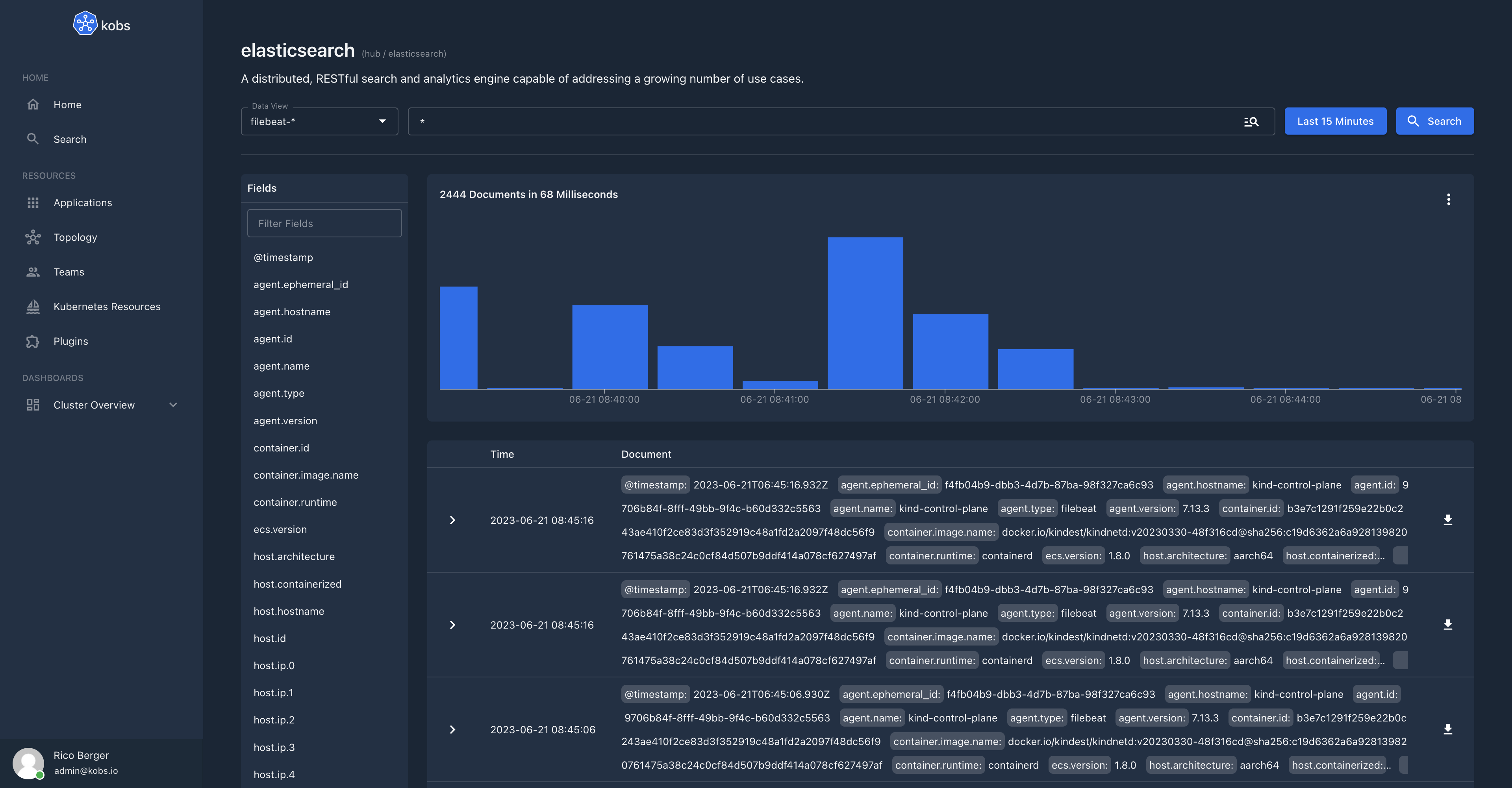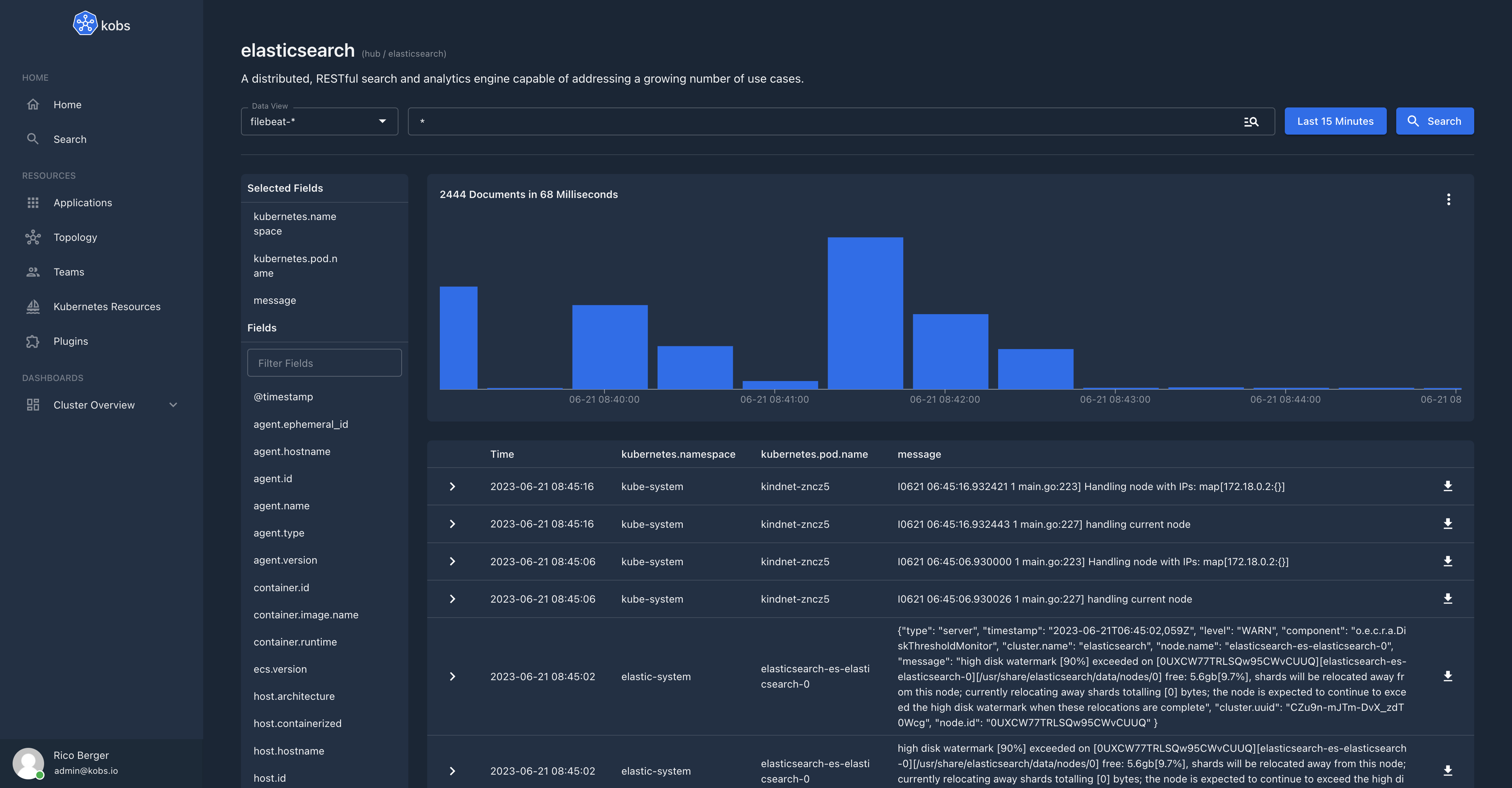Elasticsearch
The Elasticsearch plugin can be used to retrieve logs from a configured Elasticsearch instance. You can specify a query, which is used to retireve all documents from Elasticsearch. You can also select a list of fields, to display the results in a table. From this table you can also select a single document to view the complete json representation of this document.


Configuration
The Elasticsearch plugin can be used within the hub or cluster. To use the Elasticsearch plugin the following configuration is needed:
| Field | Type | Description | Required |
|---|---|---|---|
| name | string | The name of the Elasticsearch plugin instance. | Yes |
| type | elasticsearch |
The type for the Elasticsearch plugin. | Yes |
| options.address | string | Address of the Elasticsearch instance. | Yes |
| options.username | string | Username to access an Elasticsearch instance via basic authentication. | No |
| options.password | string | Password to access an Elasticsearch instance via basic authentication. | No |
| options.token | string | Token to access an Elasticsearch instance via token based authentication. | No |
| frontendOptions.dataViews.[].name | string | The name of the data view. A data view is required to access the Elasticsearch data that you want to explore. A data view can point to one or more indices. | Yes |
| frontendOptions.dataViews.[].indexPattern | string | The pattern to match your indicies (e.g. fielbeat-*). |
Yes |
| frontendOptions.dataViews.[].timestampField | string | An optional timestamp field. If you are working with logs this field should be provided. If you are working with other data like search data this field must not be provided. | No |
plugins:
- name: elasticsearch
type: elasticsearch
options:
address:
username:
password:
token:
frontendOptions:
dataViews:
- name: filebeat-*
indexPattern: filebeat-*
timestampField: "@timestamp"
Insight Options
Note
The Elasticsearch plugin can not be used within the insights section of an application.
Variable Options
Note
The Elasticsearch plugin can not be used to get a list of variable values.
Panel Options
The following options can be used for a panel with the Elasticsearch plugin:
| Field | Type | Description | Required |
|---|---|---|---|
| type | string | The panel type. This must be logs. |
Yes |
| showChart | boolean | If this is true the chart with the distribution of the log lines in the selected time range will be shown. |
No |
| queries | []Query | A list of queries, which can be selected by the user. This is only required for type logs. |
Yes |
Query
| Field | Type | Description | Required |
|---|---|---|---|
| name | string | A name for the Elasticsearch query, which is displayed in the select box. | Yes |
| dataView | string | The name of the data view which should be used for the query. | Yes |
| query | string | The Elasticsearch query. We are using the Query String Syntax for Elasticsearch. | Yes |
| fields | []string | A list of fields to display in the results table. If this field is omitted, the whole document is displayed in the results table. | No |
Usage
Query String Syntax
The Elasticsearch plugins uses the query string syntax for filtering log lines.
Field Names
You can specify fields to search in the query syntax:
- where the
statusfield containsactive
status:active
- where the
titlefield containsquickorbrown
title:(quick OR brown)
- where the
authorfield contains the exact phrase"john smith"
author:"John Smith"
- where the
first namefield containsAlice(note how we need to escape the space with a backslash)
first\ name:Alice
- where any of the fields
book.title,book.contentorbook.datecontainsquickorbrown(note how we need to escape the*with a backslash):
book.\*:(quick OR brown)
- where the field
titlehas any non-null value:
_exists_:title
Wildcards
Wildcard searches can be run on individual terms, using ? to replace a single character, and * to replace zero or more characters:
qu?ck bro*
Regular Expressions
Regular expression patterns can be embedded in the query string by wrapping them in forward-slashes ("/"):
name:/joh?n(ath[oa]n)/
Fuzziness
We can search for terms that are similar to, but not exactly like our search terms, using the "fuzzy" operator:
quikc~ brwn~ foks~
Ranges
Ranges can be specified for date, numeric or string fields. Inclusive ranges are specified with square brackets [min TO max] and exclusive ranges with curly brackets {min TO max}.
- All days in 2012:
date:[2012-01-01 TO 2012-12-31]
- Numbers 1..5
count:[1 TO 5]
- Tags between
alphaandomega, excludingalphaandomega:
tag:{alpha TO omega}
- Numbers from 10 upwards
count:[10 TO *]
- Dates before 2012
date:{* TO 2012-01-01}
Boolean operators
By default, all terms are optional, as long as one term matches. A search for foo bar baz will find any document that contains one or more of foo or bar or baz. We have already discussed the default_operator above which allows you to force all terms to be required, but there are also boolean operators which can be used in the query string itself
to provide more control.
The preferred operators are + (this term must be present) and - (this term must not be present). All other terms are optional. For example, this query:
quick brown +fox -news
Grouping
Multiple terms or clauses can be grouped together with parentheses, to form sub-queries:
(quick OR brown) AND fox